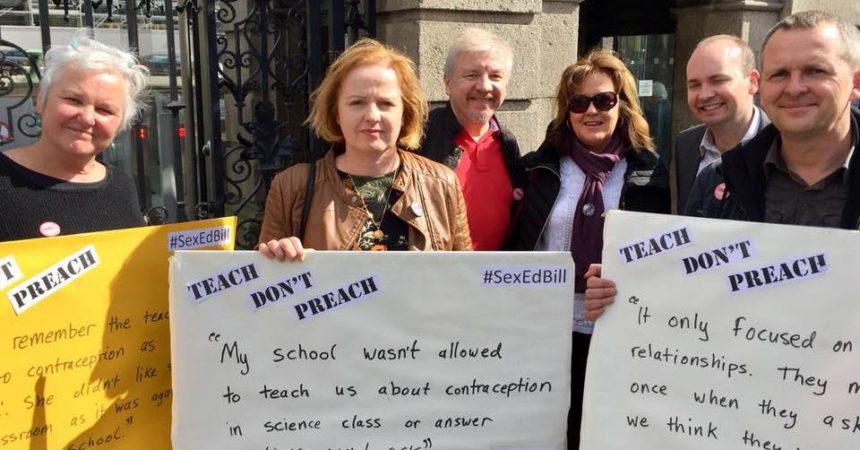
Important vote this Thursday on Solidarity’s Objective Sex Education Bill
Following today’s decision by Fianna Fail to oppose Solidarity’s Objective Sex Education Bill, and Fine Gael’s decision to not oppose it, it is important that all TDs are present at the vote tomorrow (Thursday 19 April) to ensure that it is passed.
Atheist Ireland has tonight sent this email to all TDs. Please contact your local TD and ask them to be present to support this Bill in the vote.
Dear TD,
You have already read Atheist Ireland’s Briefing Document outlining why you should support Solidarity’s Objective Sex Education Bill.
This email addresses the reasons that Fianna Fail gave, in the Dail debate today (Wednesday), to justify opposing the Bill in tomorrow’s vote (Thursday).
We are asking Fianna Fail TDs to reconsider that decision, and we are asking all other TDs to ensure that you are present to support the Bill tomorrow.
Fianna Fail said in the Dail that it will oppose the Bill because the content of the curriculum should be decided by the NCCA rather than by legislation.
But this Bill is not only about the content of the curriculum. It is also about the delivery of the curriculum, and in particular the influence of the ethos of the schools on that delivery.
And we already know what the position of the NCCA is on this issue.
Without the change in the law that this Bill proposes, it does not matter what the NCCA decides, because the NCCA has no legal power over how the curriculum is delivered.
The Position of the NCCA
The NCCA recently addressed an issue with the exact same conflict, when it was asked to design a new course on Education about Religions, Beliefs, and Ethics.
It identified, as problems to the objective delivery of the curriculum, the specific sections of the Education Act that the Solidarity Bill seeks to change.
The NCCA concluded:
“The consultation brought to light many issues and systemic features that, while external to the development of curriculum and beyond the remit of the NCCA, have a significant impact on curriculum implementation in primary schools.
The legislation underpinning our education system is one such feature. The Education Act (1998), while recognising the rights of the patron body, has the unintended effect of limiting what is achievable through a state curriculum in Education about Religions and Beliefs and Ethics.
This challenge arises not from the patron bodies which have a legislative right to teach the primary curriculum in accordance with the ethos of their schools, but rather by the structure of the primary school system which is predominantly faith-based.
The provision of Sections 9(d), 15(2)(b) and 30(2)(b), among others, are potential barriers to the type of ‘objective, critical and pluralist’ approaches advocated in the proposals for a curriculum in ERB and Ethics.”
The Position of the Catholic Church
The Catholic Bishops and the Catholic Primary Schools Management Association both made written submissions to the NCCA consultation on Education about Religions, Beliefs and Ethics.
These submissions make clear that the Education Act needs to be changed, as is proposed in the Solidarity Bill, if there is to be any chance of objective sex education happening in practice.
The Catholic Bishops said:
“In the area of Relationships and Sexuality Education… it is explicitly acknowledged that the curriculum must be interpreted in the context of the characteristic spirit of the school. Similarly, NCCA proposals in areas such as religion and ethics should accord with the characteristic spirit of the school. The determination of the ethos or characteristic spirit of a school is not the function of the NCCA or the Minister but rests with the Patron.”
The Catholic Primary Schools Management Association said:
“Based on this, the development of NCCA proposals in areas impinging on religious education and the characteristic spirit of the school are of a different nature than other NCCA proposals. This is already acknowledged in the area of Relationships and Sexuality Education as part of the NCCA SPHE curriculum where it is explicitly acknowledged that the curriculum must be interpreted in the context of the characteristic spirit of the school. Education about Religious Beliefs and Ethics is another such area.”
The Position of the Department of Education
The Department of Education has also made clear, in a 2015 research paper titled ‘Advancing School Autonomy in the Irish School System’ that the existing legal position places the power in the hands of the patron bodies.
That paper says:
“In all primary and post-primary schools, the school’s stated ethos (or characteristic spirit as it is termed in the legislation) is decided by the owners or patrons/trustees of the school and not by central government.
Autonomy over ethos does not exist at the level of the school board, principal or teachers. Indeed, one of the specific duties of a board is to uphold, and be accountable to the patron for so upholding, the characteristic spirit of the school.
Thus, depending on the unit of analysis, schools may be viewed as fully autonomous in respect of ethos, or partly autonomous if the unit of analysis in an individual school operating within a specific ethos.”
Conclusion
If passed, this Bill will guarantee that all children in Irish schools have access to objective relationship and sexuality education, without religious influence.
It is not in the common good to let private bodies, the vast majority Roman Catholic, deliver sex education only through their own ethos in order to promote and evangelise their own mission.
Please ensure that you are present to support this important Bill.







0 Comments
No comments!
There are no comments yet, but you can be first to comment this article.